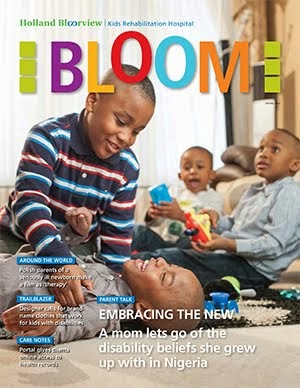I'm watching snowflakes fall outside my massive window at Holland Bloorview.
One of the unique things about our newish building (2006) is floor-to-ceiling windows that let in natural sunlight—something you don't see in many hospitals.
The glass is so clean and unobstructed that I can see big fat fluffy flakes close up. Further out the churning up of so many tiny dots of snow looks like millions of frenetic stars.
What strikes me as the wind changes is how many flakes float by my window in a relatively straight path, while some rise above and others, farther away, are in a free-fall.
Children are often compared to snowflakes—each one different and unique.
But as I look out it all appears so random—the course of these snowflakes, which are carried up, which are carried along, and which fall (I realize they all eventually fall). And that's how I feel about my son with severe disabilities, when I think of him in relation to his siblings and other children. Most children are gifted at birth with the tools that will allow them to do all the regular things in life, and many come with superstar abilities across the board, allowing them to ascend in the conventional world of success.
And then there are children with disabilities that touch everything, who seem to have been destined from birth for a free-fall. I'm not talking about an isolated physical disability or hearing loss, which can be worked around. I'm talking about kids who have physical disability plus hearing loss plus no speech plus fine-motor problems that limit sign plus learning problems plus health problems, plus, plus, plus.
There isn't any rhyme or reason as to which child gets what. We don't start out equal and it certainly isn't just.
It's World Down Syndrome Day today, but all I can think about is that 26-year-old man man with Down Syndrome, the one who sat back down in a Maryland movie theatre in January when his caregiver went outside to get the car. Robert E. Saylor was his name. When asked to leave, he refused. He was handcuffed and forced to the ground by three deputies working extra hours as mall security workers. During the scuffle he called out for his mother. He suffocated to death.
This morning a friend on Facebook posted a blog by a British mom. Two days ago she learned that her daughter's teacher was being charged with physical and emotional abuse, which included taping her daughter's wrists together, hitting her in the face with a book, and kicking her. The girl is in elementary school and has Down syndrome.
A couple of days ago there was a story about a mother who learned caregivers were beating her adult son with autism after she placed cameras in his home. I didn't want to watch the news clip, but I made myself. I just did a google search for the story and quickly gave up: I couldn't find it because there were too many stories about people with autism being beaten.
There isn't really any point to this, other than to say that some kids are born so vulnerable, in so many ways, that it's hard to keep them floating.

























4 comments:
Yes.
You are doing something every single day, Louise, not just by sharing your work with your own son but by sharing these stories with us, increasing awareness, providing resources. Snowflakes give off light, don't they?
Both national and regional databases need to be organized and made available online to families; convicted individuals and the businesses they work for must be publicly named and tracked just like sexual predators are.
Louise,
When I read and hear stories like Robert Saylor, it breaks my heart. When I read that you write there are too may stories about people who have autism being beaten, it breaks even more. Why are we - mankind - so cruel to each other? If only everyone could see the beauty of our kids the same way you saw the beauty of the snowflakes...
Post a Comment